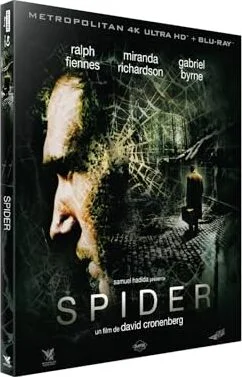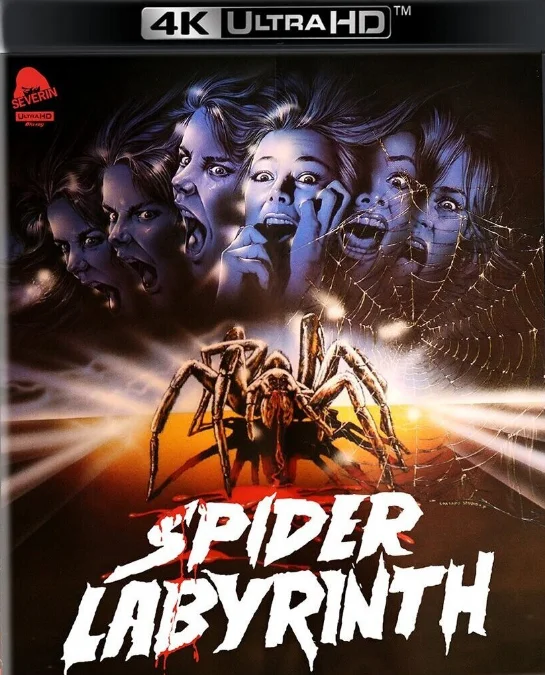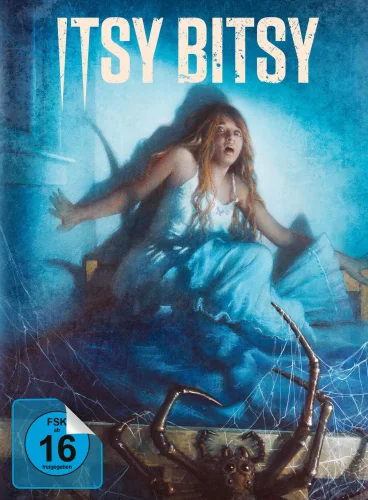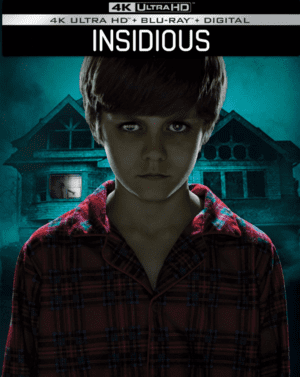Story Movie
After spending 20 years in an insane asylum, strange and unsociable Dennis Clegg returns to the dark corners of the East End where he spent his childhood. Like a spider, he tears through the web of memories that has entangled his sick mind, reliving the pain and fear that have become his only friends in a home that is more like hell.
Review 4K Movie
Man turned into a fly, produced broods of freaks, mutated and self-destructed. Gadgets ingrown into the flesh, the videodrome sucked in, the reality of existentiality dissolved. Venereal horror was born, transformed into syphilis of the spirit. The air smelled of disaster, and Cronenberg was great and terrible. But then came the spider. It's hard to say why Patrick McGrath's unpretentious novel piqued the interest of one of body horror's brightest exponents. The book is notable only for the denouement and the creation of a dragging atmosphere of London limbo, populated by helpless dead souls. In fact, Cronenberg's movie is built on this feeling of powerlessness. Never before has a man been so weak, pushed to the margins of life, trapped in the cage of his own consciousness. His heroes, no matter how dependent they were on their surroundings, always chose this slavery themselves: they inserted the videotape themselves, implanted the bioport in their spine, released their anger, vanity, lust. Dennis Clegg is different. He is mad, and madness is not a choice. In the here and now, transgression is replaced by a motif of alienation. A hunched man steps off the King's Cross platform and walks uncertainly towards his new haven. He has been transferred from a psychiatric hospital to a kind of asylum for the incapacitated, located in the London neighborhood where Spider spent his childhood. Where his mother was murdered.
Through the eyes of the mentally ill hero we look at his new life, bounded by four concentric circles. The exterior is a deserted block of unfriendly streets, the embankment of a shallow rivulet, and a gas station towering above it all, inspiring vague anxiety. Inside the boarding house there is an official poverty, decorated with dirty wallpaper, peeling paint and rusty stains on the tiles. In the gloomy interiors, a human shell with only one desire - to hide, to cower in a corner, to freeze in a fetal position, wrapping its arms around itself, to bury itself in the greasy shirts worn one on top of the other. The smaller the man, the more clothes he wears. The last circle is consciousness. The hero struggles to escape the trap of memory, scribbling indecipherable scribbles of his past in a tattered notebook. Reality is torn by reflexive flashbacks and wrapped in the subtle shadows of delusions. Defense mechanisms kick in psychosomatically, paralyzing limbs time and again. The intuitive fear of memories is confirmed by the editing logic: at crucial moments the memory portal slams shut, and the hero symbolically scatters the puzzle around the room, or gives the good doctor the last piece of the broken mirror, or hysterically tears out the pages of the diary and locks them in a suitcase. But in the end he still has nothing left but to clench a bunch of keys in his fist to unlock the farthest, darkest closet of consciousness. This is how the precarious impersonality of the surrounding world, a world alien and hostile, unable to become home, sags under the weight of childhood psychosexual traumas.
According to Cronenberg himself, “The Spider” was conceived as a confrontation between Samuel Beckett and Sigmund Freud. Well, with great regret we can state that Beckett was more spectacular, but Freud won for some reason. In a strange way it turns out that it is the denouement, which was the whole point of the novel, and it is the unambiguousness of the ending that spoils everything. Beckett's artistic space with its surreal fragility, permanent and inexhaustible anxiety simply cannot withstand the pressure of bare facts. The movie's body, crucified between the Oedipus complex and the Madonna Harlot complex, inspires a palpable sense of discomfort with its helplessness. Yes, the director's skill is evident in the details. In the way the perception of the mother in Spidey's mind is seemingly subtly transformed. One - the image of the whore from the bar is superimposed on the image of Mrs. Clegg putting on, along with a new nightgown, the hope of her desirability. Two - red lipstick outlines her lips, and something in her voice subtly changes, a distance appears between her and her son. Three - Mrs. Clegg leaves the house to find the straying Mr. Clegg and never returns. Dennis considers his father an enemy, thinks he killed his wife to bring some prostitute into the house. And in a way, it is true: the “basic instinct” has defeated the maternal one. In addition, it's amusing to see Lynchian motifs in this bifurcation of the female character, especially since Cronenberg actively denied any resemblance between them. The submissive Mrs. Clegg is contrasted with the vulgar Yvonne, like Sandy Williams with Dorothy Vallens in Blue Velvet, with both characters wearing the same face, like Renee and Alice in Highway to Nowhere.
Yeah, curious. Yes, it's well-crafted. The main problem of a good, frankly speaking, movie, which does not allow it to become something more, is its isolation in itself. A little later, in “A Dangerous Method”, the director, arguing Jung's dissatisfaction with the theory of his older comrade, will reproach the latter with the fact that his approach only explains the causes of the disease, but does not lead the patient further, to healing. It's the same with “The Spider.” Rafe Fiennes' benefit as a lost, nervous mumbler is clearly not enough - you need either a super idea or - if we are talking about the illusory nature of reality, about how a man, like a spider, weaves it from the scraps of his perception - an element of doubt. Something that would make one doubt the end of the game, the correctness of the conclusions drawn. A spiraling highway or, at the very least, a spinning wolf. After all, Beckett's “Happy Days” was much more convincing in Alexei Balabanov's “Happy Days”, David Lynch's territory is best played by David Lynch himself, and embedding the plot in a typical psychoanalytic scheme once again confirms what unimaginable pops old man Freud has turned into. The spider releases a fragile thread to weave a web as fine as muslin, but it tears, tears, tears, and, in response to the director's question, “Who are you Mr. Clegg?” - echoes, “Where are you, Mr. Cronenberg?”





 [/full-link]
[/full-link]
 [/full-link]
[/full-link]
